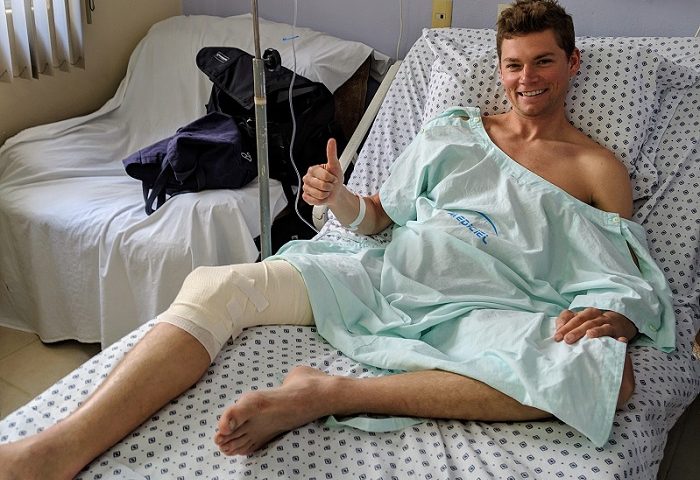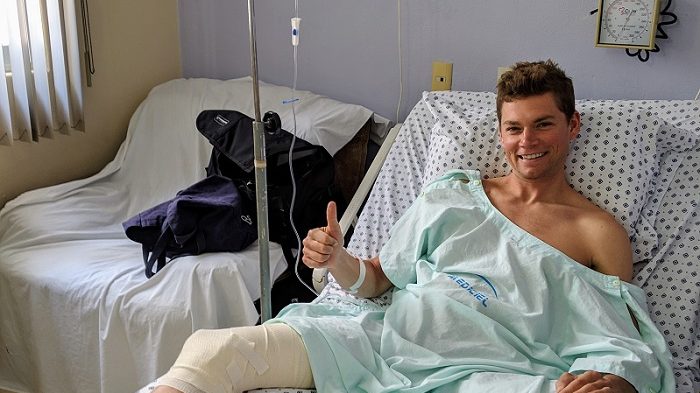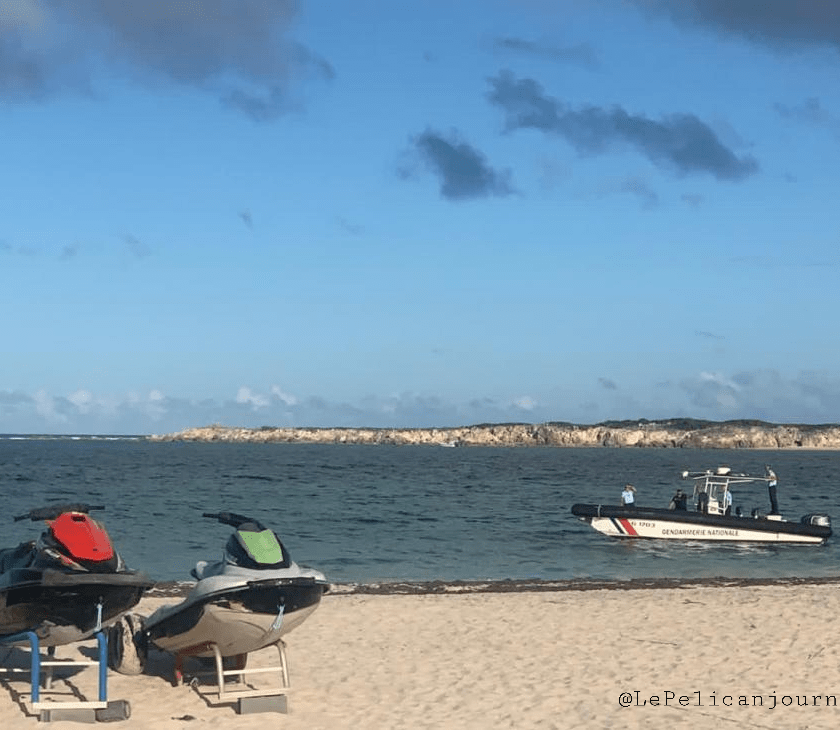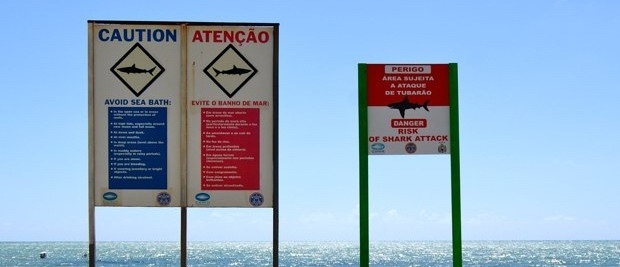In March 2019, an American swimmer was bitten by a shark in Mexico.

Traveling from California, Alex Wilton, 32, and his girlfriend arrived March 21 at the village of Troncones in the state of Guerrero for a friend’s destination wedding. After their lengthy journey, the couple was eager to take a quick dip before the festivities began.
After a half hour in the waist-high water before the surf break, Wilton decided to go on a swim for exercise. His girlfriend told him to meet her at the hotel beach chairs after it. Wilton put on goggles and swam past the surf break to water flat enough to swim freestyle, about 50 to 100 yards off shore.
Wilton had been freestyle swimming for about 5 minutes when a shark bit his leg.
“The first experience I had was my entire right leg being lit up with pain and being knocked,” Wilton told Tracking Sharks.
He tucked his chin down in water to see what happened and watched as a large gray and white shark swimming 3 to 4 feet away.
Out of breath, he popped his head above water to breathe. When he put his head back down to scan the scene under water, the shark was 20 to 40 feet away, and disappearing from his field of vision.
He remained with legs down and looking down in the water, while blood from his right thigh muddled the water. While the position felt safer than swimming because he could see in all directions, he knew he would have to start swimming back to shore before too much blood was lost or the shark returned.
“The horror and fear of that swim . . . I can’t describe it,” he said.
“I stopped twice to look behind me, looking above and below the water. And if I had seen just a sliver of gray or white it would have been a whole other scenario … not sure if I would have been able to keep swimming.
“I had a feeling, and I am not sure if this actually right, that if I made it to the surf break and got caught up in a wave breaking, that I would be safer than the open water swimming.”
Once he hit the breakers, he let out a big sigh of relief and another when he stepped on the sandy bottom another 25 yards past the break.
“When I was swimming, I wasn’t having to grit my teeth to deal with immense pain,” he explained. “It was slight pain, and what I did feel was the whole right leg just not functioning correctly.”
However, once he collapsed on the beach, “that’s when my leg lit up again and was pounding with pain.” He’d screamed “Shark, Shark!” as soon as he hit the beach.
The intense pain of the shark bite on his lower right inner thigh was incapacitating. His girlfriend rushed to his aid and immediately stepped into action: helping him hobble out of the water, telling him to lie down on the sand, using her sarong to wrap the wound, and yelling for assistance.
Three tourists ran to the couple and carried Wilton from the water’s edge to the beachside hotel. After setting him down, one of the tourists used a towel to create a tourniquet at the top of the leg to stem the bleeding. Wilton’s girlfriend ran inside the hotel and asked the owner to call for an ambulance. When she realized how long the ambulance would take to arrive, she convinced the owner to transport Wilton to the hospital in his personal car.
Ten minutes later the car pulled into a medical center, and they began pulling Wilton out of the car, but someone from the center ran out and told the group there was no surgeon at the location.
Wilton and his girlfriend were devastated, their confidence in the hotel owner was waning, but he assured them he would get Wilton to another hospital.
Nearly 10 minutes later they arrived at a better-equipped facility and doctors immediately took Wilton into the operating room to begin cleaning the wound.
Dr. Cesar Alejandro Maciel Vargas grabbed Wilton’s hand and said, “You are going to be okay.”
The doctor’s assurance was the third time Wilton said he sensed relief, the first when he made it to the surf, and the second when he reached the beach. After hearing the doctor say that, Wilton no longer believed he was in a life or death situation.
Several doctors examined Wilton, including an American orthopedic surgeon who rushed to the hospital from the wedding party, and found the shark bite had missed Wilton’s femoral artery and the adjacent nerves by approximately an inch and a half.
RELATED: Shark Attack Prevention tips
During the next hour, Dr. Vargas and staff tended to Wilton’s wounds; he received 10 internal stitches and 17 external stitches from just below his right knee up to mid-thigh.
Wilton remained in the hospital for that night and the next two nights, flying back to California on March 24. Thankfully, the airlines were very accommodating; they had a wheelchair waiting for Wilton during flight transfers and allowed him to keep his leg elevated while on the planes.
Since being bitten, Wilton has made a great physical recovery. He used crutches for about a week before he began using his leg again. Despite the heavy limp during recovery, eventually he gained almost full mobility, and is now able run again with a physical therapy goal of being able to ski this coming winter.
His mental recovery has also been a positive journey so far, with a long way to go.
The nightmares and flashbacks steadily decreased over the first month. Wilton is now working with a psychiatrist to increase how comfortable he is being in the ocean.
“I have swum in fresh water a couple times since the attack and the visuals all kept coming back to the point where I did not enjoy it and/or had to get out of the water. Getting back to where I was with the ocean is going to take a while, but I feel like I can get there eventually. Getting in up to my waist is one thing, I can do that now. Getting out into the surf where it is deep enough you can’t stand is a whole other thing. That will take longer.”
There have been a total of 72 shark attack bites (67 with injury, 19 of which are considered provoked*) publicly reported and verified in 2019.
All locations have been marked on the 2019 Shark Attack Map.
Five fatal**; 41 were reported in the U.S. (including one fatal), with 22 occurring in Florida (4 provoked) 12 in Hawaii (2 no injury, 4 provoked, 1 fatal) and 2 in California (1 no injury). Ten have been reported in Australia, zero fatal. Four unconfirmed bites, worldwide, not included in the total count.
*Provoked defined as spearfishing, feeding sharks, fishing, etc. (listed with green marker).
**One possible scavenge


